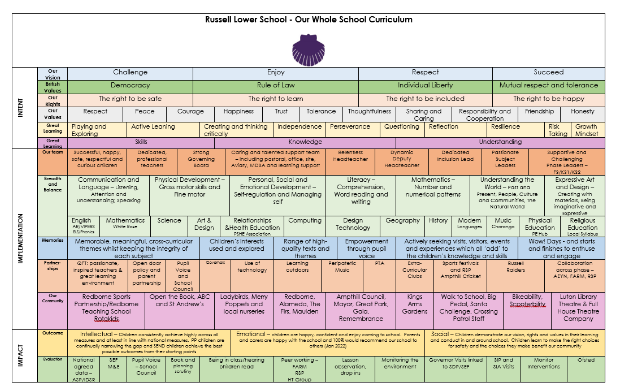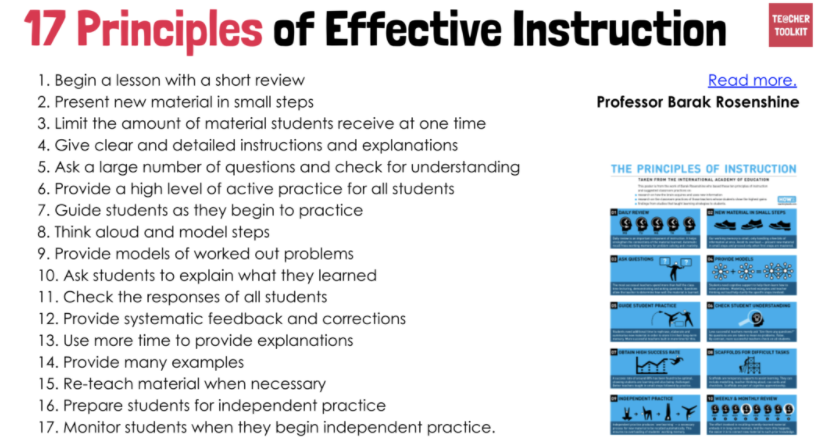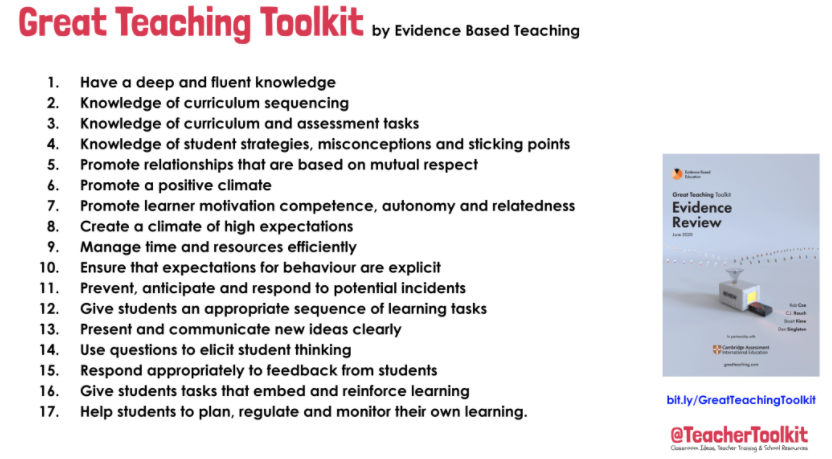Curriculum (including RE) Policy
Introduction:
The curriculum lies at the heart of education. It determines what children will know, understand and be able to do by the time they leave Russell Lower School. Our curriculum is broad, balanced, ambitious and coherently planned and sequenced towards cumulatively sufficient knowledge and skills for the next stage in children’s education. It provides children with the knowledge, skills and learning behaviours required to become successful life-long learners focusing not only on the formal requirements of the National Curriculum but also the range of extra-curricular activities that Russell organises in order to enrich the experiences of our children contributing to their cultural capital.
The curriculum’s intent:
At Russell Lower School, we have designed a curriculum which is built upon our vision statement, so children can be challenged, enjoy their learning, respect each other and succeed.
At the heart of our school are a set of core rights and values. These underpin our curriculum and the ethos of the school. We expect all children and adults to display these values - everyday to everyone. These values and behaviours 'protect' our Russell Rights which we hold dear and underpins everything we do:
-
The Right to be Safe
-
The Right to Learn
-
The Right to be Happy
-
The Right to be Included
At Russell Lower School, we place great importance on a curriculum which develops the whole child. Through our core values and rights, we foster an environment where the emotional, physical, academic, social, moral, spiritual and cultural development of each child is developed. We firmly believe that everyone is entitled to an ambitious curriculum and our curriculum design is accessible for all, including children with SEND and disadvantaged backgrounds.
At Russell Lower School, we are a knowledge-engaged school, where knowledge underpins and enables the application of skills, and we aim to develop both. We also aim to develop life skills such as resilience, a growth mind-set and perseverance, alongside our school values and four Russell Rights. See more on this below in our ‘Whole School Curriculum’:
Whole school curriclum
Within our curriculum, there is a strong emphasis on developing core skills in literacy and maths, but also personal, social and emotional skills. There are opportunities to apply these across the curriculum. We consider the Russell curriculum to be so much more that the individual subjects.
The curriculum is the totality of all the children’s learning experiences.
At Russell Lower School we believe that the curriculum should be broad, balanced and relevant. It should meet all the needs of the children, whatever their ability. The curriculum taught is made up of:
- the Early Year Foundation Stage Curriculum (2024)
- the National Curriculum (September 2013)
- The Rising Stars Progression Framework
- RE syllabus (Religious Education in English Schools, Non-statutory Guidance 2010 - Agreed 2024 – 29)
- Personal, Social, Relationships and Health Education
- Spiritual, Moral, Social and Cultural education
- British Values
- Russell Rights and values
- A wide range of extra-curricular activities and experiences
The curriculum taught meets the statutory requirements.
At Russell Lower School, we aim to offer a broad and balanced curriculum which enables all pupils to:
-
Have equal access to learning, with high expectations for every pupil and appropriate levels of challenge and support
-
Challenge themselves and rise to our high standards of achievement and progress
-
Enjoy learning whilst feeling safe and valued
-
Develop core skills in English and Mathematics
-
Develop knowledge, understand concepts and acquire skills, and be able to choose and apply these in relevant situations
-
Become successful lifelong learners who are able to reach their full potential
-
Be prepared effectively for the next stage of their education
-
Be equipped with the knowledge and cultural capital they need to succeed in life
-
Achieve age related expectations, whenever possible
-
Be confident enough to take risks in their learning
-
Explore their social, emotional, spiritual, moral, cultural, mental and physical development in supporting them to understand and respect diversity
-
Develop as caring and responsible citizens who respect one another, our planet and a range of values and beliefs
-
Develop life skills such as resilience, a growth mind-set and perseverance, alongside our school values and four Russell Rights
-
Develop a sense of self-esteem: be well balanced and healthy individuals who are able to self-regulate
-
Be independent thinkers/learners who are able to seek solutions creatively and cooperatively
-
Promote the learning and development of our youngest children and ensure they are ready for Key Stage 1.
The Implementation of the curriculum:
Implementation describes the way in which we deliver our curriculum intent consistently each day. To do this we have carefully designed our knowledge engaged curriculum.
It is delivered using a variety of approaches and resources depending on the nature of the subject being taught and the needs of the children. For more details please refer to the separate curriculum pages on the school’s website.
Our curriculum is designed to enable all children to acquire relevant subject knowledge which underpins the application of skills. We have a clear learning sequence across the school, outlined in our subject syllabuses, which ensures progression in each subject, enabling powerful learning as children build on and link to previous learning supporting them in acquiring depth as they ‘know more and remember more’. Knowledge is consolidated and built upon to support retention and recall. This ensures that by the time children leave our school they have learned, and are able to recall and apply the key information that we feel is important in order for them to be successful in the next stage of their education and beyond.
To ensure the highest possible levels of progress and attainment for all the children who attend Russell Lower School, it is essential that there is a shared understanding of what constitutes highly effective learning and the highly effective teaching that enables this to occur. We aim to use research-based approaches, with proven impact. ‘Golden threads’ through our implementation are a focus on teaching, learning and using vocabulary and building ‘sticky knowledge’ via ‘Flashback 4’ and similar recall methods.
As curriculum lies at the heart of education, and subject lies at the heart of the curriculum, then it follows that teachers need solid knowledge: content knowledge and understanding of the subjects they teach. As well as this, they need to know how to teach that particular subject (pedagogical knowledge), and more generally how to teach effectively. At Russell Lower School we use ‘Rosenshine’s Principles of Effective Instruction’ and the EEF’s ‘Great Teaching Toolkit’ as our guiding models.
How do we plan for Cultural Capital?
Cultural capital is the essential knowledge that children need to prepare them for their future success. It is about giving children the best possible start to their early education.
At Russell Lower School, we see cultural capital as the accumulation of knowledge, skills, attitudes, habits and vocabulary that enables individuals to thrive. Our curriculum plays a crucial role in developing this through immersing children in sport, dance, music, visiting theatres, galleries and historic sites; and by introducing them to literature and art.
Embedding cultural capital into our curriculum is a way of closing the gap between children from differing socio-economic backgrounds by ensuring that children from all backgrounds have opportunities to achieve their full potential.
Organisation and Planning:
The curriclum is delivered using a variety of approaches and resources depending on the nature of the subject being taught and the needs of the children. For more details please refer to the separate curriculum pages on the school’s website.
Our curriculum is designed to enable all children to acquire relevant subject knowledge which underpins the application of skills. We have a clear learning sequence across the school, outlined in our subject syllabuses, which ensures progression in each subject, enabling powerful learning as children build on and link to previous learning supporting them in acquiring depth as they ‘know more and remember more’. Knowledge is consolidated and built upon to support retention and recall. This ensures that by the time children leave our school they have learned, and are able to recall and apply the key information that we feel is important in order for them to be successful in the next stage of their education and beyond.
The curriculum is designed to promote enjoyment of learning and to be fun and engaging. We endeavour to ‘bring learning to life’ and make it ‘irresistible’ wherever possible with an emphasis placed on cross curriculum links (supported by our themes) and supported by high quality, engaging texts as well as other quality experiences such as educationally appropriate visits, visitors, theme days and ‘wow’ events.
Our subject syllabuses contain the relevant EYFS Early Learning Goals (See our EYFS policy for information on how our early years curriculum is delivered) and National Curriculum requirements for the subject. Each syllabus contains a unit overview with links to medium term plans. This is followed by our assessment milestones for each year group.
The Foundation Stage curriculum is planned on a yearly basis linking to the Prime and Specific Areas of Learning in the EYFS and is guided by the children’s interests. In KS1 and KS2 our curriculum is planned on a yearly cycle. We consult the children regularly (pupil voice) to involve them in planning and decision making and involve parents in their children’s learning at every opportunity.
All teachers are responsible for planning, evaluating and teaching in their classes ensuring they meet the expectations and content coverage required within the National Curriculum. Class teachers meet weekly to ensure continuity of provision and moderation in terms of expectations and outcomes across the year group/phase. Attention is given to appropriate adaptations to support progression and attainment as part of the planning process.
If you would like more information about the curriculum please speak to the Class Teacher in the first instance.
The Impact of the curriculum:
Children leave Russell Lower School with the academic, personal, social, moral and cultural skills, knowledge and understanding that they need to be successful in the next stage of their education. They know how to make a positive contribution to their local community and how to be the best they can be. Children leave Russell Lower School as confident and respectful learners.
Ultimately, the impact of the curriculum is the sum total of the skills, knowledge and understanding the children have acquired, as well as the personal characteristics they have developed, during their time at Russell Lower School.
The impact of the curriculum is measured in a variety of ways, using data and ‘softer’ outcomes such as behaviours, attitudes, knowledge, skills, understanding and enjoyment.
Staff assess the impact of the lessons they teach using a range of methods. Formative assessment and feedback are on-going all the time in lessons. Planning is adapted in the light of assessment so that learning activities best meet the children’s needs and enables progress to the next steps in learning.
Classroom Monitor captures the outcome of assessments. Each autumn, spring and summer term, summative assessment information is gathered and shared via Pupil Progress Meetings and Subject Leader monitoring.
Pupil voice interviews, planning scrutinies, book scrutinies, deep dives and lesson observations take place termly to assess the quality and impact of the curriculum.
Children’s achievements are celebrated regularly in school through discussion, marking and feedback, displays, certificates and stickers, parent events and assemblies.
Parents receive feedback on the impact of the curriculum via their children, Parents’ evenings, reports and discussions with staff.



